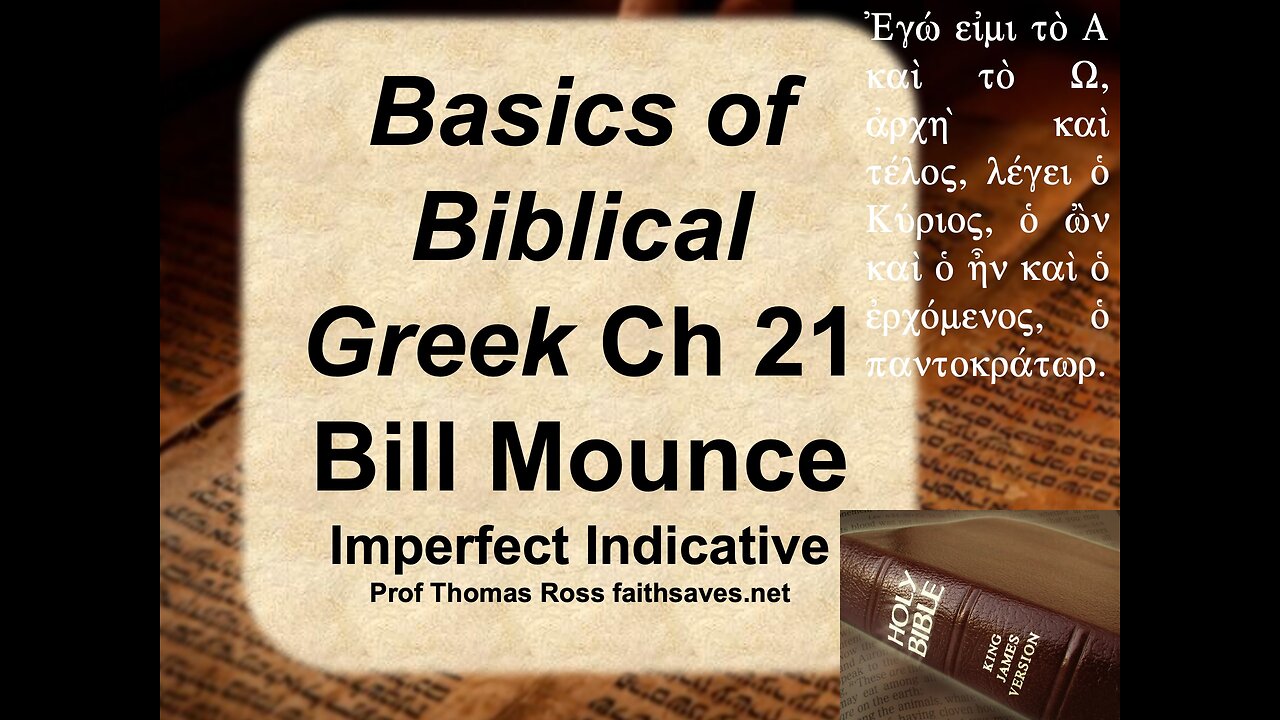Premium Only Content

New Testament / Koine Greek 26, Chap 21: Basics of Biblical Greek, Bill Mounce: Imperfect Indicative
Lecture 26 in New Testament or Koine Greek covers chapter 21 of William (Bill) Mounce’s Basics of Biblical Greek textbook, the imperfect indicative verb. This is the first lecture of the 2nd semester! The first semester covers chapters 1-20 of Bill Mounce's textbook, while 2nd semester covers chapters 21-36. The lecturer is independent Baptist professor Thomas Ross.
Chapters 21-25 of William Mounce's Basics of Biblical Greek completes the student's knowledge of the indicative verb system. In the indicative time does play a role, but the primary significance of the Greek verb is its ability to describe aspect, or type of action. The imperfect tense describes a continuous action normally occurring in past time. Greek forms the imperfect by augmenting the tense stem. The augment is a lengthening of the beginning of the verb, either with an epsilon if the verb begins with a consonant or through vowel lengthening for verbs beginning with vowels. Chapter 21 will also cover the important secondary endings, the last two sets of personal endings—so at the end of chapter 21, when you have learned the active and passive imperfect, you will indeed know all the personal endings that you will need for NT Greek!
The exegetical insight has some good truth to it--the gates of hell will not prevail against Christ's church-but its view of Galatians 1:13 is not entirely accurate.
As an overview, in chapter 21 we learn a new Greek tense, the imperfect. The imperfect is used to describe an action in the past with a continuous aspect. That is, we learn how to say “I was studying” or “I was learning” in Greek. We learn:
• that the imperfect indicates a continuous action that usually occurs in the past;
• that the imperfect is formed with an augment, the present tense stem, a connecting vowel, and secondary personal endings;
• that an augment is a prefix indicating past time. If the verb begins with a consonant, the augment is an epsilon (λύω → ἔλυον); if the verb begins with a vowel, the augment is the lengthened vowel (ἀγαπάω → ἠγάπων);
• secondary active and passive endings, the final two sets of personal endings.
Greek has two distinctly different tenses for past time. One is for past time with a snapshot or what Mounce calls “undefined” aspect, and the other for a continuous aspect. Greek does not have two different tenses in the present, one to express snapshot actions and one for continuous actions, but has a single present tense form, but in past time there are two different tenses, one for snapshot and one for continuous action. So to say something in past time you wished to describe as a snapshot action, such as “I read,” you would naturally use the Greek aorist tense. The imperfect, by contrast, portrays a continual action in past time.
Two new things in forming the imperfect are an augment and secondary personal endings. The augment is a prefix added to the beginning of a Greek verb that puts the verb in past time. The augment puts the verb in past time and is part of how the imperfect tense is formed in Greek. you can think of it as similar to the “—ed” suffix that we add to verbs in English when they are in past time. So in English “preach” in present time becomes “preached” in past time. The Greek augment performs a similar function as a prefix to the English “–ed” as a suffix. So that is an augment.
A primary tense is a tense that is not augmented. We have studied two primary tenses up to this point: the Greek present and the Greek future. (We started learning the primary personal endings in chapter 16.) So a primary tense is an unaugmented tense, and it uses primary personal endings. The secondary tenses, by way of contrast, do use an augment as well as using secondary personal endings.
How do you form the imperfect active indicative? You take an augment, add the present tense stem, add a connecting vowel, and then add secondary active personal endings. So, for example, you could take the augment ε, add the present tense stem λυ, add the connective vowel ο, and then the first person plural secondary active personal ending μεν, in order to produce the form ἐλύομεν, “we were loosing.” So ἐλύομεν is the 1st person plural imperfect active indicative form of λύω.
The full paradigm for the imperfect active indicative is ἔλυον, ἔλυες, ἔλυε(ν), ἐλύομεν, ἐλύετε, ἔλυον.
To form an imperfect middle/passive indicative, you begin with the augment, add the present tense stem, a connecting vowel, and the secondary passive personal endings. So for our standard paradigm verb λύω, we begin with the augment ε, add the present tense stem λυ, add a connecting vowel (which in the case of the first person plural on the chart is ο because it comes before a μ or a ν), and then add the secondary passive 1st person personal ending, which is μεθα, resulting in the form ἐλυόμεθα, “we were being loosed.”
The full paradigm for the imperfect middle/passive indicative is ἐλυόμην, ἐλύου, ἐλύετο, ἐλυόμεθα, ἐλύεσθε, ἐλύοντο.
-
 21:12
21:12
DeVory Darkins
12 hours ago $15.59 earnedGavin Newsom gets what he deserves after NBC Reporter FACT CHECKS his Lies
47.9K50 -
 1:57:13
1:57:13
MyronGainesX
12 hours agoFormer Fed Explains Sting That Led To The Murder Of A State Trooper
74.7K20 -
 3:56:27
3:56:27
Due Dissidence
19 hours agoNewsom ROASTED For Pod Save Interview, Candace Owens CALLS OUT Elon, Ian Carroll RATIOES Israel Post
71.9K52 -
 2:16:17
2:16:17
TheSaltyCracker
10 hours agoLooters Descend on LA ReeEEeE Stream 01-12-25
143K303 -
 40:32
40:32
Man in America
15 hours agoRockefeller Medicine COLLAPSES as God's Natural Healing Takes Over w/ Angie Tomky
50.8K18 -
 2:03:30
2:03:30
Nerdrotic
12 hours ago $6.91 earnedMysteries of Egypt with The Brothers of the Serpent | Forbidden Frontier #087
52.7K3 -
 2:29:27
2:29:27
vivafrei
20 hours agoEp. 245: Los Angeles ON FIRE! Gavin Newsom FOR JAIL? Trump SENTENCED! Pardons & MORE! VIva & Barnes
203K312 -
 5:32:42
5:32:42
Nobodies Live
11 hours ago $5.92 earnedNobodiesLive - Rumble Music TEST STREAM 2.0
67.3K2 -
 3:40:10
3:40:10
EricJohnPizzaArtist
10 hours agoAwesome Sauce PIZZA ART LIVE Ep. #30: Classic Gaming!
46.8K7 -
 1:18:42
1:18:42
Josh Pate's College Football Show
12 hours ago $0.95 earnedSEC Dominance Over | National Title Thoughts | Miami QB & DC Moves | Wrong About the Playoff?
36.5K4